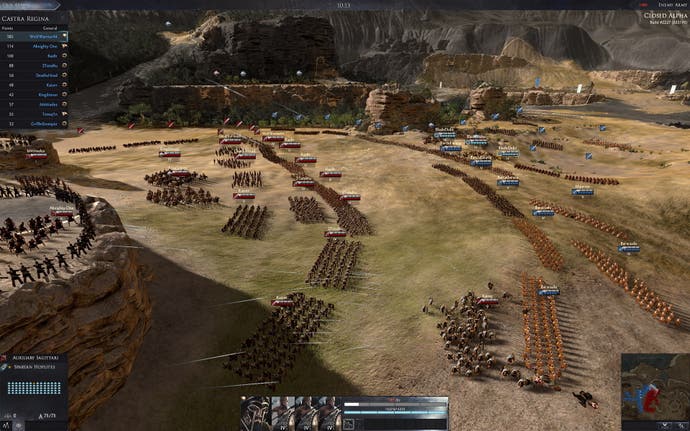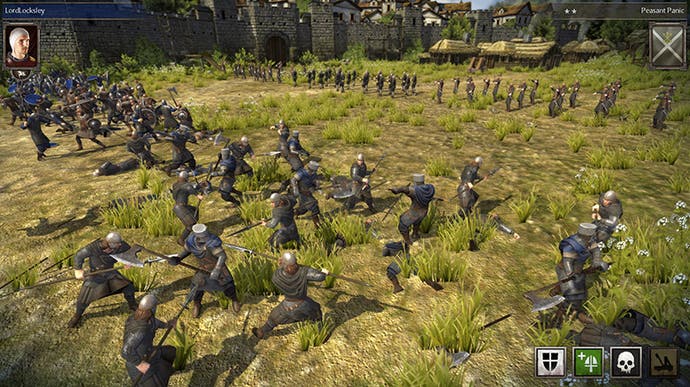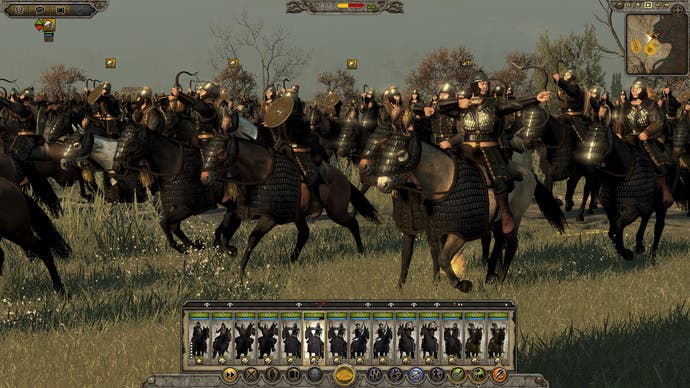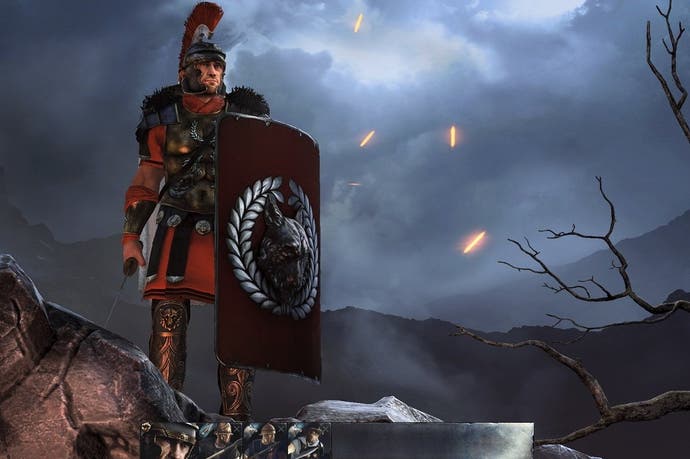The broadening horizons of Total War
How The Creative Assembly is planning an all-out assault in 2015.
This year the Total War series turns 15, and as recompense for making so many of us feel so horribly old The Creative Assembly is celebrating with a birthday blowout of new Total War titles. The recent release of the Wrath of Sparta content pack for Total War: Rome 2 is followed on 17 February by the next major release in the franchise, Total War: Attila - but the ferocious Hun does not ride alone. Instead, he's flanked by two less traditional Total War experiences aimed at bringing in new players via the hit-and-miss gift horse of free-to-play.
First up is the multiplayer only offering of Total War: Arena, while the second is cross-platform desktop and tablet title, Total War Battles: Kingdom. The question is whether these new titles will enhance the series' illustrious legacy or fail to make their mark and suffer the ignominy of obscurity.
In its current form, Total War: Arena will struggle to shine. Comprised of 10 vs 10 PvP battles aimed at annihilating the opposing side or capturing their base camp, each player controls three units led by a famous commander, who confers bonuses of a particular flavour. As commanders gain experience, higher tier units can be drafted in and upgraded via the currency earned through battles (or micro-transactions, presumably). Its fast-paced 15 minute battles are tempered by pre-match decisions regarding army composition and unit maintenance.

Playing an hour's worth of games in quick succession reveals Arena to be limited fun that currently falls into a no man's land between being immediately accessible to Total War virgins and tactically satisfying for series veterans. The problem for newcomers is one of communication and how information about unit stats and upgrades is presented. In contrast, for experienced Total War-mongers used to managing dozens of units at a time, the problem looks to be one of underwhelming simplicity. Project lead Gabor Beressy acknowledges the former criticism, though he takes exception to the latter.
"Currently, we don't have a tutorial but we're definitely planning to implement one to help those people who are having problems with the camera controls or number of units. However, we also have the potential for a really complex battle game that perhaps doesn't come through after playing just a couple of games but is there for those that stay longer term."
Player feedback will define Arena's future development, Beressy says, and while the team has ideas of its own concerning meta-games, varied eras and naval battles, it will ultimately be about how players respond that will determine its future shape. The enthusiasm is encouraging, but there's a danger that this MOBA-style title could fail to capture the imagination of those all important new players if it doesn't become more focused and user-friendly over the coming months (to help that happen, you can sign-up for the current phase of the closed-alpha on the Total War: Arena website).
Happily, the prospects for Creative Assembly's second free-to-play offering seem rosier. Total War Battles: Kingdom is a follow-up to 2012's Shogun, though it's a bigger, more complex proposition than its predecessor, factoring in empire building, land management and free-form army construction. It features the expected free-to-play timer mechanism for tasks such as farm-building and diplomacy missions, but once your kingdom reaches a decent size there looks to be plenty to do in between waiting for those timers to tick down (or paying for the convenience of insta-completion).

Battles last just a few minutes and can be played as PvE or PvP, though the latter only comes into effect if you enable it or opt in to the PvP-focused campaign endgame. As such, leaving the game alone for a few days won't result in your kingdom being pillaged while you're away. Customisation options for both your kingdom and army are being touted as a key feature and between the sense of ownership of your empire that this facilitates and the bite-sized management tasks and fast-paced battles, Total War Battles: Kingdom could prove more substantial fare for those grown weary of repeatedly clashing clans with friends and strangers.
While Arena and Kingdom are busy trying to forge their own paths, the main event for seasoned players is undoubtedly next month's release of Total War: Attila. Tellingly, The Creative Assembly acknowledges that for those on the outside looking in, its franchise might appear a series of games that are "broadly similar but with different historical hats on". To this end, they're looking to mix things up by shifting the focus from building a glorious empire to either preserving or destroying one.
"This time around what you see is the breakdown of an empire and the last chapters of ancient Rome and the start of the Dark Ages," explains project lead, Janos Gasper. "This means there's turmoil and destruction and a huge mass of people moving around and ravaging the land, making Attila a survival strategy game that requires you to get to grips with those changes.
"Most of the new features are focused on this breakdown, with dynamic fire and destruction and the Huns at the very centre of this mix. We're also focusing on emergent story-telling, which is very important to us and the unpredictability of the new elements lends itself well to this type of campaign."

Details of these new elements, along with an explanation of the reworked family tree and how climate change affects the well-established Roman Empire and the migratory habits of the nomadic tribes, are explored during the last look at the preview build of Attila.
It's important that Attila switches things up, of course, but equally important is that it doesn't repeat Rome 2's teething problems - particularly in regard to how the AI reacts to the new dynamic elements; something that Gasper and his team are confident will be delivered thanks to the studio's experience of the past eighteen months.
"Attila is built on the basis of Rome 2, so all of the upgrades sit atop a stable base. We were very ambitious with Rome 2 and we wanted to change a lot of things and add a lot of new things. With Attila being built on this strong foundation, it's allowed us to make some major leaps by sharing the technology and experience between teams."
Total War's 15th year is set to be a busy one, then, as The Creative Assembly rolls out its war machines to lay siege to several fronts at once. The plans are laid and battle lines drawn but while every project lead inside The Creative Assembly believes they can plot a successful course, they must also know from experience that there's always the possibility of casualties. Nonetheless, for PC and tablet owners with an eye on waging total war this year, there's seldom been a greater choice of battlegrounds on which to do so.









